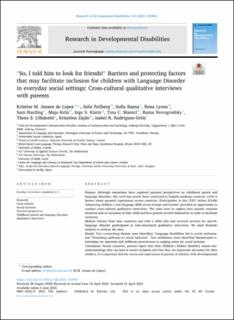| dc.contributor.author | Jensen de López, Kristine M. | |
| dc.contributor.author | Feilberg, Julie | |
| dc.contributor.author | Baena, Sofia | |
| dc.contributor.author | Lyons, Rena | |
| dc.contributor.author | Harding, Sam | |
| dc.contributor.author | Kelić, Maja | |
| dc.contributor.author | Klatte, Inge S. | |
| dc.contributor.author | Mantel, Tina C. | |
| dc.contributor.author | Novogrodsky, Rama | |
| dc.contributor.author | Ulfsdottir, Thora S. | |
| dc.contributor.author | Zajdó, Krisztina | |
| dc.contributor.author | Rodriguez-Ortiz, Isabel R. | |
| dc.date.accessioned | 2022-05-12T12:55:43Z | |
| dc.date.available | 2022-05-12T12:55:43Z | |
| dc.date.created | 2021-12-09T12:57:24Z | |
| dc.date.issued | 2021 | |
| dc.identifier.citation | Research in Developmental Disabilities. 2021, 115 . | en_US |
| dc.identifier.issn | 0891-4222 | |
| dc.identifier.uri | https://hdl.handle.net/11250/2995476 | |
| dc.description.abstract | Purpose
Although researchers have explored parental perspectives on childhood speech and language disorders, this work has mostly been conducted in English-speaking countries. Little is known about parental experiences across countries. Participation in the COST Action IS1406 ‘Enhancing children’s oral language skills across Europe and beyond’ provided an opportunity to conduct cross-cultural qualitative interviews. The aims were to explore how parents construe inclusion and/or exclusion of their child and how parents involve themselves in order to facilitate inclusion.
Method
Parents from nine countries and with a child who had received services for speech-language disorder participated in semi-structured qualitative interviews. We used thematic analysis to analyze the data.
Results
Two overarching themes were identified: ‘Language disabilities led to social exclusion’ and ‘Promoting pathways to social inclusion’. Two subthemes were identified Interpersonal relationships are important and Deliberate proactiveness as stepping stones for social inclusion.
Conclusions
Across countries, parents report that their children’s hidden disability causes misunderstandings that can lead to social exclusion and that they are important advocates for their children. It is important that the voices and experiences of parents of children with developmental disabilities are understood and acknowledged. Parents’ recommendations about how to support social inclusion need to be addressed at all levels of society. | en_US |
| dc.language.iso | eng | en_US |
| dc.publisher | Elsevier | en_US |
| dc.rights | Attribution-NonCommercial-NoDerivatives 4.0 Internasjonal | * |
| dc.rights.uri | http://creativecommons.org/licenses/by-nc-nd/4.0/deed.no | * |
| dc.title | “So, I told him to look for friends!” Barriers and protecting factors that may facilitate inclusion for children with Language Disorder in everyday social settings: Cross-cultural qualitative interviews with parents | en_US |
| dc.title.alternative | “So, I told him to look for friends!” Barriers and protecting factors that may facilitate inclusion for children with Language Disorder in everyday social settings: Cross-cultural qualitative interviews with parents | en_US |
| dc.type | Peer reviewed | en_US |
| dc.type | Journal article | en_US |
| dc.description.version | publishedVersion | en_US |
| dc.source.pagenumber | 0 | en_US |
| dc.source.volume | 115 | en_US |
| dc.source.journal | Research in Developmental Disabilities | en_US |
| dc.identifier.doi | 10.1016/j.ridd.2021.103963 | |
| dc.identifier.cristin | 1966644 | |
| cristin.ispublished | true | |
| cristin.fulltext | original | |
| cristin.qualitycode | 1 | |

